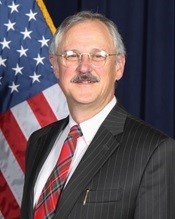
Child Abuse Reporting in the Military
Recorded On: 02/25/2021
-
Register
- Non-member - Free!
- Member - Free!
Reporting and information sharing is a foundational element of CAC-military partnerships. This webinar provides CAC personnel, MDT members, and military partners with an introduction to the role of the Defense-State Liaison Office and its initiative on child abuse and neglect identification and reporting. Participants will learn about federal law that requires military reporting of child abuse and neglect to civilian authorities and the efforts of the Defense-State Liaison program to address the lack of reciprocal federal reporting laws through state legislation. The live webinar will allow opportunity for Q&A.
This webinar was originally scheduled for January 20.

Marcus J. Beauregard
Director
Defense-State Liaison Office
Marcus J. Beauregard assumed the duties of director for the Defense-State Liaison Office within the Office of the Deputy Assistant Secretary of Defense for Military Community and Family Policy in November 2015. As director, Mr. Beauregard is responsible for an office of eight regional liaisons, a senior liaison who oversees their operations, and a senior state policy analyst. Together, they conduct strategic planning, legislative analysis, outreach and education in order to assist governors, state legislators, and other state officials in addressing the department’s priority issues affecting service members and their families. The Defense-State Liaison Office is responsible for assisting in the passage of an average of 70 state bills per year, influencing a range of titles in state statutes including absentee voting, occupational licensing, unemployment compensation, consumer protection, family law, child advocacy, K-16 education, public health, and National Guard support. The Defense-State Liaison Office consults annually with staffs working for the Under Secretary of Defense for Personnel and Readiness, military departments, National Guard Bureau, and the joint staff to develop potential state issues to ensure state policymakers consider issues that are timely and important. Prior to appointment as the director of the Defense-State Liaison Office, Mr. Beauregard worked on the team as a contractor and a civil servant beginning with the inception of the office in 2004. Before that, Mr. Beauregard served with Military Community and Family Policy starting while on active duty in the Air Force. His initial position, beginning in 1999, was that of deputy director of personnel support and education in 1999 and then, in 2000, the director of Morale, Welfare, and Recreation policy.
